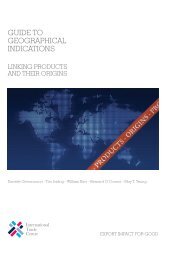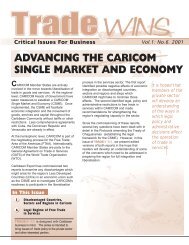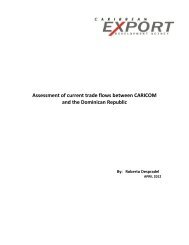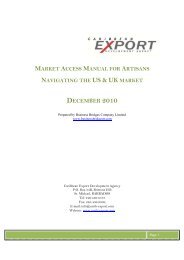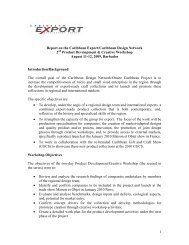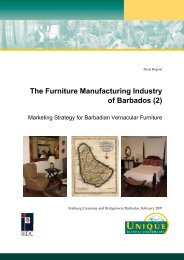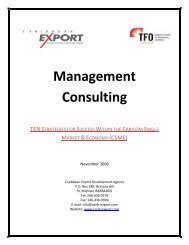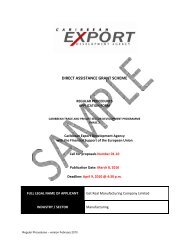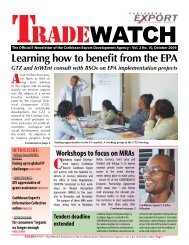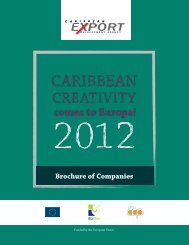doing business with cuba - Caribbean Export Development Agency
doing business with cuba - Caribbean Export Development Agency
doing business with cuba - Caribbean Export Development Agency
Create successful ePaper yourself
Turn your PDF publications into a flip-book with our unique Google optimized e-Paper software.
classifications are based on the<br />
Harmonised Systems at the eight digit<br />
level.<br />
4.1.5 Special Provisions<br />
Entities <strong>with</strong> foreign partners may be<br />
granted duty free status for some or all<br />
of those products as part of their<br />
economic association or joint venture<br />
agreement.<br />
Provision is there for negotiating other<br />
terms of these agreements. There are as<br />
well negotiations for duty drawback in<br />
circumstances including temporary<br />
importation for upgrading or re-exports<br />
and replacement of materials<br />
incorporated in exported products and<br />
chemicals that disappear during the<br />
production process and not incorporated<br />
in the formal product.<br />
However, of note is the fact that these<br />
drawbacks are granted only when the<br />
circumstances are deemed to be in the<br />
national interest or for commercial<br />
viability in foreign markets.<br />
4.1.6 Special Custom Procedures<br />
An approved Cuban Custom Broker<br />
must handle all custom formalities.<br />
Some larger importers arrange to have<br />
staff trained and certified and pay a fee<br />
of US$50 monthly to operate internal<br />
agencies.<br />
Precise documentation and full<br />
compliance <strong>with</strong> all regulations is<br />
essential when exporting products to<br />
Cuba.<br />
Care is urged because seemingly minor<br />
discrepancies can lead to confiscation of<br />
improperly documented imported goods.<br />
DOING BUSINESS WITH CUBA<br />
14<br />
Since labelling, sanitary and<br />
phytosanitary and product safety<br />
standard regulations are enforced at the<br />
border as a practical matter, the burden<br />
of compliance rests <strong>with</strong> all exporters.<br />
4.2 Non-Tariff Barriers<br />
4.2.1 Foreign Exchange Controls<br />
There are no foreign exchange controls<br />
in Cuba. However; from time to time<br />
changes are made to the regulations.<br />
Effective November 8, 2004, the Cuban<br />
Government adjusted the laws relating to<br />
foreign exchange controls. Shops and<br />
other <strong>business</strong>es are no longer allowed to<br />
accept US dollars. Also foreigners<br />
holding US dollars are required to pay a<br />
10 percent fee for convertible pesos.<br />
Previously the convertible pesos were<br />
used interchangeably <strong>with</strong> US dollars.<br />
However, this is no longer the case.<br />
4.3 Labelling and Marking<br />
Requirements<br />
The National Standards Office in Cuba<br />
sets out strict guidelines for labelling all<br />
products exported into Cuba. These<br />
standards are similar to other countries’<br />
regulations. The following are the<br />
guidelines:<br />
• Specific name of the product(s)<br />
• Labels must be in Spanish<br />
• Labels must contain ingredients<br />
of products<br />
• The expiry date must be cited<br />
• Net Content must be listed<br />
• Price<br />
• Quantity of units



